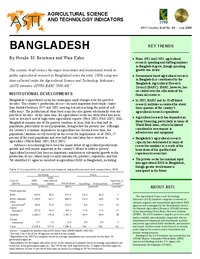Authors:
Beintema, Nienke; Kabir, Wais
Year:
2006
Publisher
International Food Policy Research Institute (IFPRI); and Bangladesh Agricultural Research Council (BARC)
Back to:
Overarching responsibility for the coordination of public agricultural research in Bangladesh lies with BARC, which is responsible for planning, integration, implementation, and evaluation of research.
Like many other low-income countries, Bangladesh’s agricultural research capacity has deteriorated in terms of researcher numbers and researcher qualifications as the more qualified and experienced researchers are drawn away by opportunities abroad. Despite this brain-drain, Bangladesh still has a high share of MSc- and PhD-trained research staff compared with surrounding countries like Sri Lanka and Malaysia.
Agricultural research has depended on donor funding, especially through various World Bank credit, which enabled Bangladesh to make considerable investments in its
infrastructure and equipment. Nevertheless, and despite increases in recent years, the intensity of the country’s agricultural research investments remains low. A primary goal of the most recent World Bank project was to improve the efficiency of the agricultural research system, but the wideranging institutional reform necessary for the successful achievement of this goal did not occur. BARC still has no control over the allocation of financial resources at the institutes it oversees since these are administered by four different government ministries and have individual, legally enacted management boards. In addition, the efficiency of the system continues to be poor because of its large number of, often overlapping, research stations and substations, each with its own management and support facilities. This has been recognized as an ongoing problem requiring attention, and plans to address the issue are in development.

